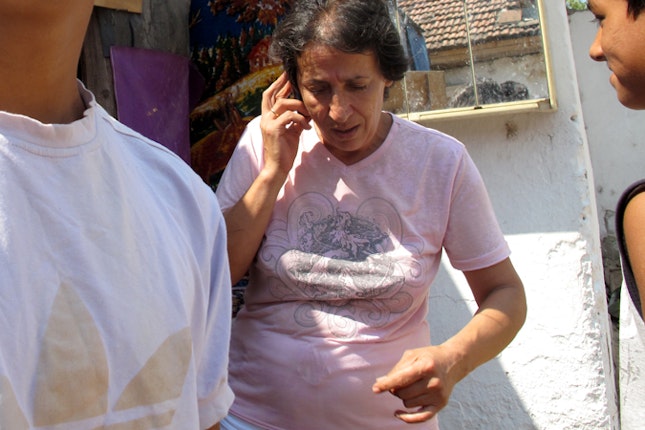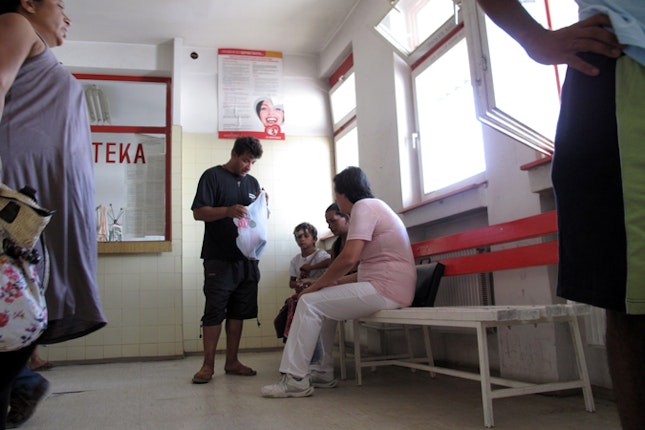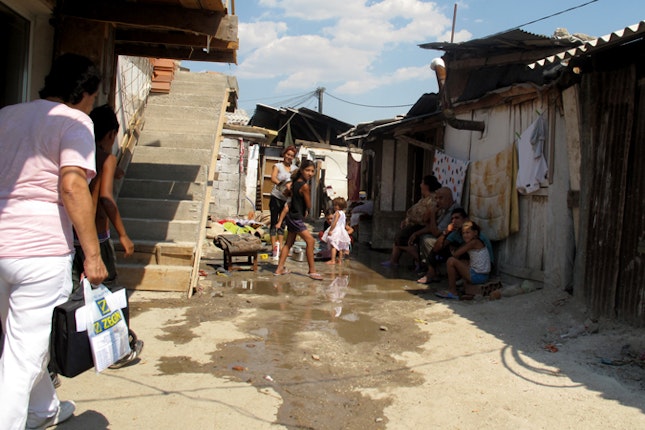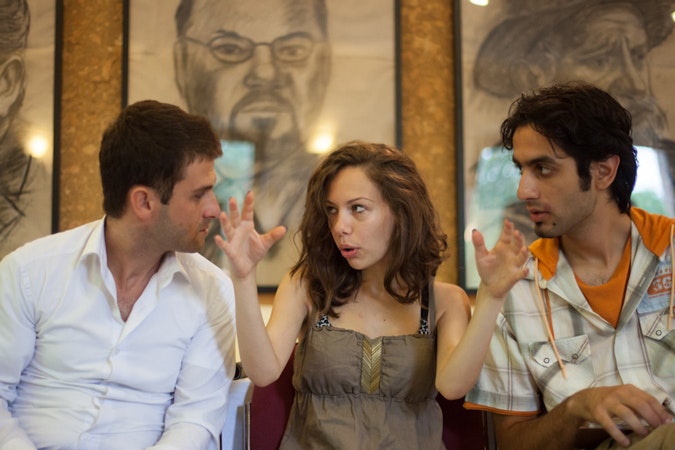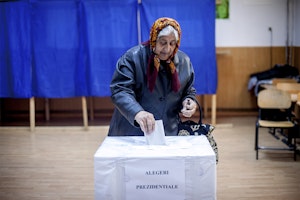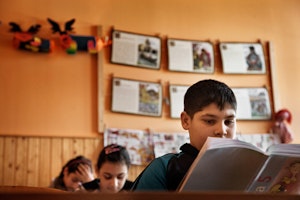Roma in Political Life: Macedonia—Pride and Prejudice
By Chuck Sudetic
Since Macedonia’s emergence as an independent state in 1991, the country’s Roma have not suffered spates of skinhead violence or racist scapegoating. Macedonian political leaders have refrained from attempting to build popularity among their constituents by making inflammatory statements scapegoating the Roma. There has been no significant popular outcry in Macedonia against providing the Roma with state social assistance, though it is minimal. Nor have governments at the national or local levels passed laws and ordinances that discriminate improperly against the Roma.
In its Preamble, Macedonia’s Constitution places the country’s Roma on an equal par with the minority Albanians, Turks, Vlachs, Serbs, and Bosniaks. Macedonia’s government included the Roma language in its 1994 census, which encouraged many Roma to have themselves tallied as Roma. Beginning in 1996, four primary schools in Macedonia began offering instruction in the Roma language as an optional subject. The official gazette of Šuto Orizari (pronounced SHOO-toh oh-ree-ZAH-ree), the Roma-majority municipality on the edge of Skopje, Macedonia’s capital, became the first official publication of its kind anywhere to use the Roma language. Roma, although in minimal numbers, have been members of Macedonia’s parliament since 1990.
Much of the reason for the “inclusion” of the Roma in public life in Macedonia, however, has nothing to do with warm regard for the Roma or respect for their rights. Prejudice against the Roma does exist in Macedonia, and manipulation of the Roma is evident in government policymaking. Policy decisions beneficial to the Roma have had more to do with a calculated effort by leaders of Macedonia’s majority to offset the will of leaders of the country’s ethnic-Albanian minority who have threatened the secession of areas of Macedonia with significant ethnic-Albanian populations. To this end, Macedonian political leaders have managed to co-opt much of the country’s Roma population and a significant array of Roma leaders. As a result, Macedonia’s Roma political parties have consistently stressed the loyalty of the Roma people to the Republic of Macedonia and its territorial integrity. They have also remained mostly quiet about the fact that the transformation of Macedonia’s political and economic systems since independence has not significantly closed the yawning social and economic gaps between Roma and the rest of the country’s population.
By 2013, however, a growing number of Roma—especially, perhaps, educated young people—were faulting established Roma political leaders for doing too little to improve the harsh living conditions many Roma suffer and to press Macedonia’s government for greater inclusion of the Roma in the country’s political, social, and economic life. Many Roma, young and old, say they mistrust the established Roma political leaders and dismiss them as corrupt opportunists who have placed themselves at the service of the ruling party du jour in order to pursue their personal interests at the expense of the community’s and who, in many instances, neglect even to do the paperwork necessary to pursue funding grants from abroad that might have a significant positive impact on impoverished Roma people.
“We need a national unification as Roma,” said Latifa Šikovska, a community health mediator who has worked with thousands of Šuto Orizari’s residents and now ponders running for mayor there. “There are 53,000 of us in Macedonia out of 2.3 million. And the political leaders divide the vote, misusing their own people by selling votes to other parties.”
“Roma problems do not find a place on the agenda,” said Samet Skenderi, head of the Initiative for Social Change, a nongovernmental organization. “Everything that has been accomplished has been the result of pressure from abroad,” he added, alluding to pressure by the European Union on Macedonia’s leaders to comply with minority rights requirements that must be met before Macedonia can become a European Union member state.
At the core of many Roma complaints lies an inequitable distribution of public sector jobs. Macedonia’s Constitution was adopted on the basis of a so-called Framework Agreement, which was concluded in 2001, with international assistance, in an effort to forestall a potentially catastrophic armed conflict between Macedonia’s Slavs and ethnic Albanians.
Based on the Framework Agreement, provisions in the Constitution aim at ensuring that the ethnic structure of the workforce in Macedonia’s public administration reflects the ethnic composition of the overall population. As a result, from 2000 to 2010, there was a significant increase in the percentage of public administration positions filled by Roma, from about 0.1 percent to about 0.6 percent. The Roma, however, officially account for 2.66 percent of Macedonia’s population, which means that, despite the increase, they are still grossly underrepresented. The actual discrepancy is probably greater given the fact that the official census understates the real number of Roma in Macedonia’s population, because, among other factors, many Roma declare themselves to be Macedonians, Albanians, Turks, or members of some other ethnic group.
“For years, the paucity of Roma in public sector positions—except the dirtiest jobs done by, for example, sanitation departments—was rationalized by saying that there were too few educated and qualified Roma,” said Samet Skenderi. “So we fought to have five places for Roma in the university. Now there are more than five hundred Roma students.”
Elvis Shakiri, a 24-year-old post-diploma student of criminal law, was one of dozens of Roma young people who demanded equitable distribution of public sector jobs during a demonstration on the streets of Skopje in August 21, 2012. “There are now fifty or sixty young people with college educations, and still they say there is no work for us,” he said.
“We have had to work twice as hard for our degrees, because of the discrimination and corruption in education,” said Sara Sejfula, a 23-year-old graduate with a master’s degree in social work. “Now, we have to fight to get what we deserve.” Presently, obtaining a public service position requires a kickback to a political party of two months of salary as well as a pledge to bring 15 voters to the polls, she added. “We want Roma people to be hired on the basis of their qualifications and ability.”
Case in Point: Šuto Orizari
Macedonia’s raucous, sprawling Roma enclave, Šuto Orizari, is a unique example of how a government ghettoization scheme undertaken by Macedonian officials with little complaint by Roma leaders—combined with unqualified leaders, a lack of economic opportunity and civil society organization, low levels of education, high levels of corruption, and other factors—left a Roma-led local government feckless and unresponsive to the community’s needs.
The world’s largest concentration of Roma, Šuto Orizari, emerged after an earthquake ravaged most of Skopje’s medieval Roma quarter in 1963. To provide shelter to displaced Roma, the government chose an empty pasture for the construction of a cluster of barracks. Over the years, Šuto Orizari grew into a warren of brick and stucco houses: some of them the proud homes of Roma who migrated abroad, found jobs, and saved their money, others the humble dwellings of Roma who barely make ends meet. Today, the enclave’s residential neighborhoods surround a few government buildings, shops and restaurants, a mosque, a football field, a sprawling dump, a health clinic lacking a gynecologist, and a bustling market, the largest in all of Macedonia, where tax-dodging merchants sell designer brand knockoffs.
Šuto Orizari’s official population is about 22,000, but officials in the municipal administration say the actual number is about 30,000 and many of them, including Roma refugees from Kosovo, have no registration papers. Unemployment is rampant. About 90 percent of the residents are receiving a 30-euro monthly welfare payment, which they supplement by selling goods at the market; collecting and selling scrap glass, metal, and paper; begging; selling drugs; or engaging in prostitution.
Šuto Orizari is a paradox for Roma. On the one hand, it is a source of pride, and rightfully so. Since a redistricting that took place in 1996, Šuto Orizari has been the world’s only Roma-majority municipality and the only jurisdiction on earth where Roma is an official language. Thanks to several films, including Emir Kusturica’s Cannes-winning Dom za vešanje (Time of the Gypsies), Šuto Orizari is also the most famous of Skopje’s 10 municipalities, a place where many Roma prefer to reside among other Roma and where practically everyone calls it, with typical wry humor, Šutka (SHOOT-kah), a Slavic word meaning “joke.” Since Šuto Orizari’s incorporation, its voters have elected Roma mayors to run the local administration and Roma to fill most of the seats in the municipal council. All of which qualifies Šuto Orizari as a kind of living, shouting, rumbling, horse-drawn manifestation of inclusion.
On the other hand, however, Šuto Orizari is a quintessential ghetto. Its delineation in 1996 was not undertaken to include the Roma or satisfy their needs as a community. It was, instead, part of an effort by Macedonia’s leaders to gerrymander municipalities with significant numbers of ethnic Albanians in order to dilute the Albanians’ political power and ensure the Macedonian majority’s continued political control.
The delineation also left Šuto Orizari bereft of significant sources of employment and tax revenue. “No one will talk about what we inherited there in terms of a tax base,” said a former member of Šuto Orizari’s municipal administration who asked to remain anonymous. “The municipality is almost entirely residential. There is no open space left for any significant economic development. All those areas went to contiguous municipalities. So do the tax revenues produced by institutions that have been functioning on the territory that now belongs to Šuto Orizari since before it became a municipality.
“So basically, the deal the Roma received was: ‘I’ll give you a municipality, but one without a tax base to help pay for communal services.’ Other municipalities in Skopje inherited adequate infrastructure, while Šuto Orizari got very little. The capacity of the existing sewer system is not sufficient for the size of the population, for example, and some areas do not have water service. About sixty percent of the home owners pay taxes on their houses. But the government cannot be very robust in its collection of back taxes, because many residents simply cannot pay.”
The costs of the fire department, the mayor’s official car, street lighting, maintenance of the roads and public football field, and constructing and maintaining sewers and water lines are all supposed to be funded from the municipal budget. The city of Skopje pays 40 people each day to collect trash and transport it to a central location where city trucks pick it up and haul it away. The state budget covers the costs of the police department and schools, including construction of a new high school.
“Everything is corrupt, and the way things work has not taught the Roma to work for themselves, but has instead taught them to be satisfied with very little,” the former member of the administration continued. “There is actually no Roma administration in the municipality of Šuto Orizari. Of the eighteen people in the municipal administration, only the mayor, an archivist, and a secretary are Roma. Twelve are Macedonians, and the rest are Albanian or Serb. There are also too few competent people in the administration, six or seven; and they are not enough to do the work. So no one takes the time to draw up proposals for external funding. There should be four to five people from the Roma community to work exclusively on project proposals.
“Discrimination begins with the majority and ends with the Roma elite. All in all, I don’t see Roma politicians with the ability to accomplish anything. These political leaders are worn out. They are afraid of young Roma who actually know how to do something, and who really worked in school and didn’t buy their diplomas. It is important for these kids to be among the people working in all functions of local government. But many young Roma don’t want to come.”
Elvis Bajram, son of one of Macedonia’s strongest Roma political leaders, Amdi Bajram, is Šuto Orizari’s present mayor. He entered office without having completed secondary school.
“An illiterate person in politics cannot do anything for his people,” said a Roma activist who asked to remain unnamed. “An illiterate person in politics is there to do one thing: steal. Do you believe in a person who has been in political life for sixteen years and who has done nothing? You’re going to vote for him again?
“So for the political campaign, you need thugs who go and intimidate people. Next you need persons who will make promises and promises and more promises. If you have a population whose members cannot read and who depend upon social welfare and the local market, you can manipulate them easily with empty promises.
“This conforms with what the Macedonian government and the opposition want. It’s okay by them.”
This article is part of a series examining Roma political participation in France, Hungary, Romania, Macedonia, Bulgaria, and the Czech Republic.
Until November 2013, Chuck Sudetic was a senior writer for the Open Society Foundations.
